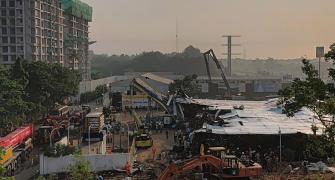Finding a solution to the spectrum allocation issue will be the main challenge before A Raja, country's new communications minister, who has replaced Dayanadhi Maran.
Even as the telecom operators are facing a big shortage of spectrum in the roll-out of their existing 2G services, the ministry has been sitting for nearly a year on the Telecom Regulatory Authority of India recommendations to auction spectrum for 3G services, which were expected to be launched in June this year.
Cellular Operators' Association of India Secretary General T V Ramachandran said, "The two key issues which need immediate action are allocation of spectrum and reduction in duties and levies on subscribers that are too high and could effect growth."
A similar view is echoed by S C Khanna, director general of the Association of Unified Telecom Service Providers of India, the body representing CDMA operators: "The government has set a target of 500 million subscribers by 2010, which cannot be achieved without additional spectrum. CDMA operators have not been given the fifth carrier spectrum and it is affecting services. The Department of Telecommunication has not pushed the defence ministry hard enough to vacate more spectrum."
Raja, operators say, also needs to push the group of ministers, headed by Pranab Mukherjee, which was set up last year to look into the transfer of spectrum from the defence ministry to the DoT. The GoM has not met even once.
Khanna said Raja also faced the challenge of creating a level playing field between the CDMA and GSM operators, which was not prevalent in Maran's regime. "The earlier regime had leaned towards GSM when allocating spectrum. We expect that to change under the new minister."
Besides, the telecom operators want the government to take immediate steps to reduce high incidence of taxation in the sector, which could hinder growth. As much as 28 per cent of the call charges is paid out as taxes, including around 6-10 per cent as revenue share of the government.
At the prodding of the finance ministry, the DoT had set up a committee recently to look into ways and means to reduce revenue share and other taxes. Ramachandran says Raja's key task would be to get this committee moving.
Raja also has to address the poor record of the country on broadband connectivity, "where we have consistently failed to meet targets". The minister may also need to revisit the Trai recommendation that 'last-mile unbundling' should be allowed to push broadband penetration, which Maran rejected "in order to protect BSNL".
In simple terms, it means allowing the private sector to use the Bharat Sanchar Nigam Limited and Mahanagr Telephone Nigam Limited's copper wire connections at homes at a price.
Telecom analyst Mahesh Uppal said, "He has to revisit the whole broadband policy of the government. Trai has also botched up the business of independent Internet service providers (by recommending that they have to pay 6 per cent revenue share)."






